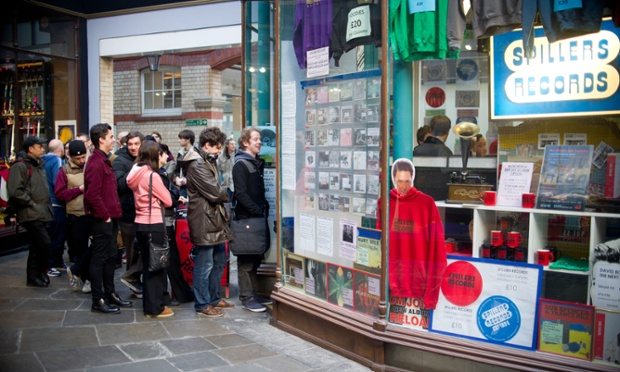Having every major music market in the world adopt Friday as release day sounds sensible – until you remember that you can hear almost every major release early anyway

Although it’s probably not a subtle tribute to On a Friday, the original name for Radiohead, a sweeping music industry initiative will see the last day of the working week become the standard release date for new records internationally.
The change – implemented by the IFPI, the trade body representing the global record business – will take effect in 45 major markets from Friday 10 July.
It’s more than just a nuts-and-bolts story about how record labels get their records into shops and on to digital services. There is also a significant marketing campaign behind it all, focusing around the New Music Fridays website, to alert consumers to this change of release date. In the UK and France, for example, that will mean having to make a mental note that new records are no longer out on a Monday. For Americans and Canadians, Tuesdays will have to be scratched out in their diaries and Fridays circled in red instead. If you are in Germany or Australia, it will be business as usual.
“The move will mean fans can now get new music on the same day worldwide rather than having to wait for their own national release day,” runs the IFPI’s statement. “It puts an end to fans being unable to access music in their own country when it is legally available elsewhere, and the frustration that can cause.”
Anyone with a decent internet connection and the ability to navigate P2P/torrent software and VPNs will no doubt be snorting in derision at this statement. The idea of waiting for an album to be released when a record company and retailer says it is being released stopped being a concern for them over 15 years ago. Stephen Witt’s new book, How Music Got Free, details how one employee at a pressing plant in the US managed to leak pretty much all of the biggest albums at the turn of the millennium. Since then, for a whole cluster of people, the idea of an official release date has been as laughably anachronistic as a family basking in the warm glow of the radiogram in the drawing room.
It is worth adding that the music industry has been its own worst enemy here and for many years has scrunched up official release dates and kicked them over the back fence. They might announce an official release date but, as part of their frenetic pre-marketing, they will often make it available to stream in advance on iTunes, Spotify, Deezer, Rdio and so on. They may even partner with a site like Pitchfork, NME or, indeed, the Guardian to offer the album early to their readers.

For those preordering an album on iTunes, the “instant grat” download has recently become a big hook, whereby they are able to download certain tracks several weeks before the album comes out. Thereafter, other tracks are drip fed to them on what seems like a whim but is actually a carefully plotted strategy between Apple and the participating record company. Last year, Ed Sheeran was able to flood the top 40 with multiple tracks from his X album even before it was released as they all came as instant grats for those who had preordered it on iTunes, the bonus for him being that they were all chart eligible.
Hardly any act is big or confident enough to “do a Beyoncé” and release an album with no pre-marketing fanfare – it’s just suddenly available. U2 tried it with Songs of Experience last year by pushing it to every iTunes customer in the world, but they failed to distinguish between excited fans clamouring for an album and just giving it to everyone whether they want it or not.
The harsh reality is that the consumer today is overwhelmed with the amount of music being released. It becomes incrementally harder for them to keep on top of release dates as there is a deluge of new music every week. In the old days of the 20th century, in roder to let the public know a record was coming out the labels just had to take out a full-page ad in the music press, stick up a few fly posters and, if they were feeling flush, run a series of TV and radio ads. Today there is so much noise from competing releases that acts and labels are desperate for anything to stand above the chatter and score a crucial competitive advantage. Hence the pre-release marketing steeplechase. And a stanadardised global release date isn’t going to change that.
It doesn’t even have to happen online. Last year, Karen O worked with the people who organise the Sofar Sounds gigs in people’s living rooms to create a listening party for Crush Songs. The hosts in multiple houses around the world were sent a vinyl copy of the album in advance to play to their guests, with the singer showing up in one home in New York to perform a surprise gig. Even Mumford & Sons got in on the act ahead of the release of their third album, Wilder Mind, last month by linking with a number of record shops as part of the Record Store Dayjamboree in the UK, the US and Germany to let people hear the album weeks in advance on vinyl.
It all leads to an update of the philosophical question about a falling tree: if a record is only released on the day it is scheduled to be released, will anyone actually hear it?
Via The Guardian



Be the first to comment